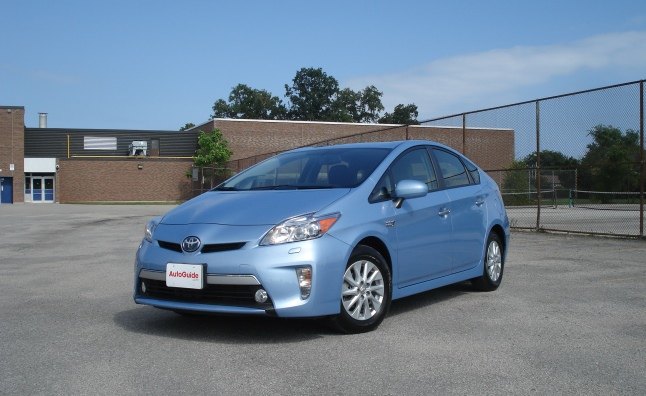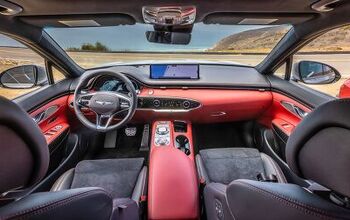2014 Toyota Prius PHV Consumer Review

The original Toyota Prius revolutionized the automotive industry in 1997.
A novel idea at the time, Toyota proved gas-electric hybrid technology could work in a reliable, everyday vehicle. Like fake carbon fiber interior trim, hybrids are commonplace in today’s automotive landscape.
But just how mainstream have dedicated, purpose-built hybrids become? Are they so advanced and seamless in operation that there are no drawbacks to owning one over a conventional vehicle? To find out we put our general consumer reviewer Amanda behind the wheel of the 2014 Toyota Prius Plug-in Hybrid Vehicle (PHV). The task that lay before her was to drive it like she would any other car, putting it to the test through her regular daily grind.
The Specs
Power for the PHV Prius is the same as the regular Prius. That means a 1.8-liter four-cylinder gasoline engine that produces 98 hp is paired up to an AC synchronous electric motor with 80 hp. Combined, the two power plants can generate 134 hp total.
SEE ALSO: 2012 Toyota Prius PHV Review
A single-speed electronic continuously variable transmission sends power to the front wheels and allows the 3,156-lb. Prius PHV to get the equivalent of 95 MPG when using the electric drive mode (15 mile electric range), or 50 MPG when using just the regular hybrid drivetrain.
The Prius PHV starts at $30,815 after destination charges. Amanda’s loaded up Prius PHV Advance with the technology package came to $38,340 and included options like navigation, adaptive cruise control, softex seats and LED headlights.
How does it Drive?
With a single-speed gearbox and highly assisted driver controls, Amanda found the Prius PHV easy to operate. Although built to maximize efficiency, the car is still stable and controllable whether on the highway or city streets.
On the other hand, acceleration is an issue. Still making only 134 HP, the Prius PHV adds over 100 lbs. compared to the base Prius. That may not sound like a lot, but it’s obvious from behind the wheel. Never quick to build speed in any situation, on the highway the lack of power is impossible to ignore.
One of the advantages of the PHV Prius is access to high occupancy vehicle (HOV) lanes where applicable, even if you’re driving alone. The downside is that acessing the HOV lane during rush hour traffic can be tricky with virtually no acceleration to speak of.
The View from Inside
Amanda found the Prius easy to get comfortable in and immediately found her preferred driving position behind the wheel. The interior finishes are adequate, but nothing feels premium, even in her loaded up top-of-the-line PHV.
Rear seat space is very usable with 36 inches of legroom and plenty of headroom for most adults. The rear cargo hold is also practical with 21.6 cubic feet of space.
What She Liked
The main feature Amanda liked the most about the Prius PHV didn’t have much to do with the car itself, but rather its ability to access the HOV lane when driving solo in rush hour traffic.
SEE ALSO: 2013 Toyota Prius Plug-in Review – Video
Being an incredibly efficient hybrid, she liked the fact that during a week of use she did not have to fill the fuel tank up once. As well, the navigation system was easy to learn, quick to respond and intuitive to use.
What She Didn’t Like
Amanda’s biggest complaint about the Prius was that the brakes are grabby, making smooth slowdowns difficult to achieve. It’s an issue we’ve experienced in the past and can corroborate.
She also wasn’t a fan of the Prius styling or the constant beeping that happens whenever the Prius PHV is put into reverse.
The Verdict
The Prius PHV is quite possibly the most hardcore hybrid on the market. It remains a vehicle for people that want to save as much gas as possible and/or make a green statement. Consumers looking for an efficient vehicle that doesn’t compromise as much when it comes to driveability, there are other plug-in alternatives like the Fusion Hybrid and Accord Hybrid, but they also command a high list price.
Purpose built hybrids have come a long way, but do still include drawbacks; some of which Amanda is not ready to live with.
FAST FACTS
Engine: 1.8L four-cylinder engine + electric motor, total output 134 HP
Transmission: eCVT
Fuel economy: 95 MPGe, 50 MPG (hybrid system)
Price: Starts at $30,815 after destination charges. Prius PHV Advance with technology package came to $38,340.
GALLERY: 2014 Toyota Prius PHV

A 20+ year industry veteran, Mike rejoins the AutoGuide team as the Managing Editor. He started his career at a young age working at dealerships, car rentals, and used car advertisers. He then found his true passion, automotive writing. After contributing to multiple websites for several years, he spent the next six years working at the head office of an automotive OEM, before returning back to the field he loves. He is a member of the Automobile Journalists Association of Canada (AJAC), and Midwest Automotive Media Association (MAMA). He's the recipient of a feature writing of the year award and multiple video of the year awards.
More by Mike Schlee
































Comments
Join the conversation